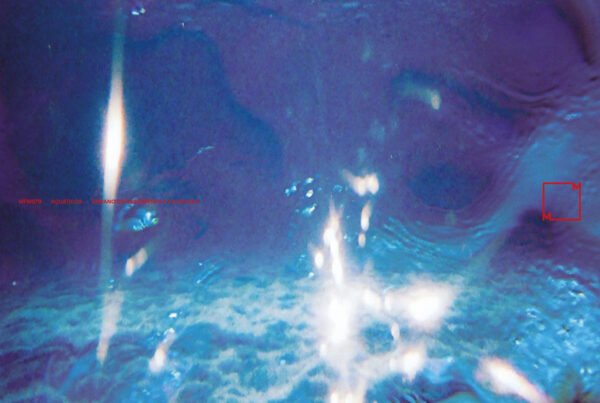The angular momentum of Minneapolis post-punk noise makers Unstable Shapes cuts through the sharpest of edges of humanity on debut Delicate Machinery.
Release date: April 11, 2025 | Learning Curve Records | Instagram | Facebook | Bandcamp
The trajectory of punk rock finds itself weaving through the sharp edges and narrow creases of noise itself, a raucous roll through a concrete sonic jungle. While bands like the Ramones and Sex Pistols simply added a distortion pedal and an attitude to a Motown sensibility, bands like Television and Gang of Four flipped those records onto a third-dimensional C-side. The guitar became a shattered, angular mess, a machine gun aimed at the heart of civilization. And with two guitars, as in the case of Television, those guitars acted as scaffolding for architecture that seemed to defy gravity. Television‘s “Marquee Moon” is a ten-minute guitar-centered opus, the massive black hole of guitar that modern noise revolves around. Minneapolis band Unstable Shapes are at the end of one of those spokes, swirling around a dense circle of open chords and bizarre runs and licks, taking the thrill of guitar-based post-rock into another stratosphere, all while staying firmly grounded in the sordid reality of 2025.
On their debut record Delicate Machinery, the Twin Cities band pays thrilling homage to all the bands that have populated the long, slender spoke that emanates from the Fender-based noise of Tom Verlaine and Richard Lloyd. Along the way, you’ll run into ’90s luminaries of post-rock adventurism such as Rodan, Unwound or Drive Like Jehu, and get entangled in the detuned web of Sonic Youth‘s glorious unhinged noise making. The music that Unstable Shapes makes is extremely centered, confident and earnest in its delivery. There’s an urgency to Delicate Machinery that makes it radiate with a historical assurity that comes from being from one of the most musically rich regions in the United States. Watch out Hüsker Dü and The Replacements: Unstable Shapes are here to take the baton and run with it.
The band’s debut record Delicate Machinery is a journey through shame, self-flagellation and enormous doses of mid-Western Lutheran guilt. Unstable Shapes is an apt moniker for a band that seems to wallow in themes of loss, missed opportunities and regrets, but they do so in such a self-assured manner that you can’t help but thinking at the end of the day, they’ll end up still standing. Battered we may be in the world of the Minneapolis quintet, but beaten is hardly the inevitable outcome it seems to be.
Partially because of the dynamic presence of lead singer Andrew Cahak, whose vocal delivery sounds as if he’s standing inches from your face while poking you in the chest with a finger, the band’s music is chaotic and immediate. There’s an old-school confidence in the song-writing and the production. The drums, bass, and vocals are front and center, while the swirling, sharp-edged guitars of Mitch Gustafson and Ryan Jaroscak are panned left and right. Anything else seems done in the room, with some amps, Fender guitars and well-cherished pedal boards. It’s as if the band is insisting we learn how to trust ourselves, rather than rely on the bells and whistles of the technology swirling around us.
Lead single “Glass Ladders” is an infectious, noisy exploration of changes, and how those changes – welcome or unwelcome – shape how we see the world. The guitars are big, epic slabs of distorted noise, moving in and out of the rhythm held down by Kevin Hurley’s bass and James Taylor’s drums. Cahak’s lyrics often err on the side of brevity, with repeated mantras and voices that bring these lines an extra weight:
‘They don’t make magazines like they used to.
They don’t make skyscrapers like they used to.
They don’t make shoe shiners like they used to.
They don’t make diplomats like they used to.Glass Ladder!‘
In the world of Unstable Shapes, it’s not the glass ceilings that are in danger of being righteously broken; it’s the fact that our feet are precariously planted on ladders made of the same substance, ready to shatter underneath our toes. The song’s mid-tempo pulse harkens back to early Jawbox, triumphantly centered around the guitars and unforgiving in its emotional plea for understanding. “Glass Ladders” is one of these songs that thirty years ago would have found the band on the stage of the Ed Sullivan Theater as they made their television debut on Letterman. But even a missed opportunity such as this is inherent in the band’s music. There’s a sense of loss and a desperate desire to recover the things we’ve misplaced along the way. Unstable Shapes exists in a world that desperately needs them, but just doesn’t know it.
The band’s spiritual fixation comes through on several songs – a single human being can haunt you ‘more than God in all the churches in Milwaukee‘; answers can (or can’t) be found in the robot head of Philip K. Dick or a local ‘sphinx’; one can hope to fly off the turn with God as a race-car driver. All of these images make the music of Unstable Shapes come across as some bizarre, chaotic testimonials of torment. The answers seem to be all around us, but they just seem impossible to find. In one of the best expressions of endless exasperation that encompass the record, Cahak pleads on “Feral Joy”:
‘I wrote a letter to all my current fixations,
To the United Nations and the Pope.
It said, ‘I’m tired of these loveless expressions,
Of these countless compressions,
And the hope…’‘
“The Local Sphinx” swirls around like a deep track from Daydream Nation, Cahak’s vocals paying homage to Lee Renaldo’s sardonic slacker delivery. A slow, dirgey single guitar opens the song with ominous riffage, before the band falls into an off-kilter, slightly dissonant melody of melancholy and submission. ‘I asked a question,’ bellows Cahak. ‘Of the local sphinx, and it answered back to me ‘Why? Why? Why?’‘ It’s a never-ending search, one that defines human existence from start to finish.
On “Sunlight” the band channels Fugazi-like energy in a song that celebrates the uber-American experience of being lost on streets where every house looks the same and every intersection with a traffic light is surrounded by dueling gas stations and CVS pharmacies. The guitars are meandering, swirling in and out of each other like the psychedelic noise of ’90s bands like Love Battery or Screaming Trees. Cahak’s voice is a shredded mess as he insists that he’s gonna get it right, despite the soul-sucking tedium of the suburban experience.
In this sense, the triumph of Delicate Machinery is centered very much in the middle-class American ordeal. In a society where it often seems our day-to-day experiences get clouded by a barrage of Idiocracy-level decision making from policy makers and billionaires, it still comes down to our own relationships with ourselves that shapes who we are. And more often than not, those shapes are precariously balanced on foundations that seem ready to crumble at any moment. Unstable Shapes has weaved its own narrative of desperation and anxiety through an angular heap of post-punk guitars, the grease-covered hands of a workman-like rhythm section, and a voice that sounds as if it’s shouting through the rusty bars of a Twin Cities jail cell for justice. Delicate Machinery acts as a record of noisy post-punk therapy, a vinyl slab of self-help for a generation that can’t seem to find it anywhere, even if it’s right there in front of our eyes.






